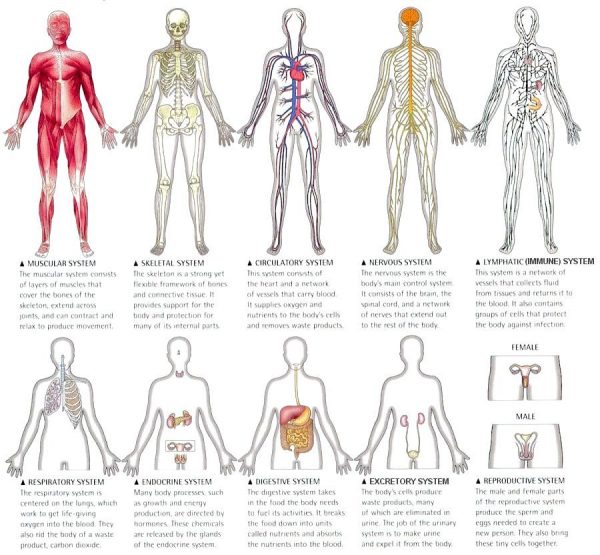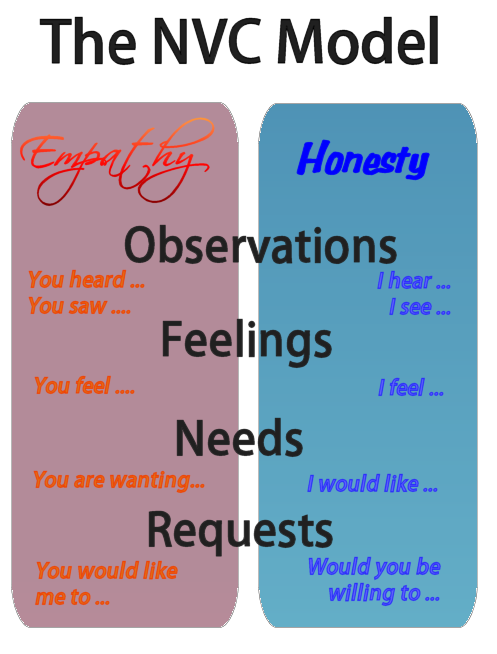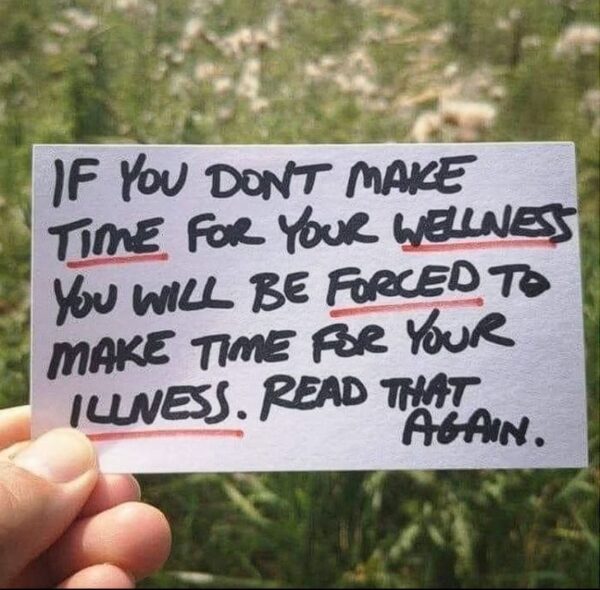How to Ensure that the foundation of your psycho-spiritual world is healthy.
You must understand your systems and begin by removing the disconnection
artifically created by different specialties!

All of these systems are connected by your emotions!
You have needs when unmet lead to stress!
Stress leads to disease!
The following list of needs is neither exhaustive nor definitive. It is meant as a starting place to support anyone who wishes to engage in a process of deepening self-discovery and to facilitate greater understanding and connection between people.
We have another list that might also be of interest to you: a list of feelings.
This list is neither exhaustive nor definitive. It is meant as a starting place to support anyone who wishes to engage in a process of deepening self-discovery and to facilitate greater understanding and connection between people.
| CONNECTION acceptance affection appreciation belonging cooperation communication closeness community companionship compassion consideration consistency empathy inclusion intimacy love mutuality nurturing respect/self-respect | CONNECTION continued safety security stability support to know and be known to see and be seen to understand and be understood trust warmth PHYSICAL WELL-BEING air food movement/exercise rest/sleep sexual expression safety shelter touch water | HONESTY authenticity integrity presence PLAY joy humor PEACE beauty communion ease equality harmony inspiration order AUTONOMY choice freedom independence space spontaneity | MEANING awareness celebration of life challenge clarity competence consciousness contribution creativity discovery efficacy effectiveness growth hope learning mourning participation purpose self-expression stimulation to matter understanding |
Feelings when your needs are satisfied
| AFFECTIONATE compassionate friendly loving open hearted sympathetic tender warm ENGAGED absorbed alert curious engrossed enchanted entranced fascinated interested intrigued involved spellbound stimulated HOPEFUL expectant encouraged optimistic | CONFIDENT empowered open proud safe secure EXCITED amazed animated ardent aroused astonished dazzled eager energetic enthusiastic giddy invigorated lively passionate surprised vibrant | GRATEFUL appreciative moved thankful touched INSPIRED amazed awed wonder JOYFUL amused delighted glad happy jubilant pleased tickled EXHILARATED blissful ecstatic elated enthralled exuberant radiant rapturous thrilled | PEACEFUL calm clear headed comfortable centered content equanimous fulfilled mellow quiet relaxed relieved satisfied serene still tranquil trusting REFRESHED enlivened rejuvenated renewed rested restored revived |
Feelings when your needs are not satisfied
| AFRAID apprehensive dread foreboding frightened mistrustful panicked petrified scared suspicious terrified wary worried ANNOYED aggravated dismayed disgruntled displeased exasperated frustrated impatient irritated irked ANGRY enraged furious incensed indignant irate livid outraged resentful AVERSION animosity appalled contempt disgusted dislike hate horrified hostile repulsed | CONFUSED ambivalent baffled bewildered dazed hesitant lost mystified perplexed puzzled torn DISCONNECTED alienated aloof apathetic bored cold detached distant distracted indifferent numb removed uninterested withdrawn DISQUIET agitated alarmed discombobulated disconcerted disturbed perturbed rattled restless shocked startled surprised troubled turbulent turmoil uncomfortable uneasy unnerved unsettled upset | EMBARRASSED ashamed chagrined flustered guilty mortified self-conscious FATIGUE beat burnt out depleted exhausted lethargic listless sleepy tired weary worn out PAIN agony anguished bereaved devastated grief heartbroken hurt lonely miserable regretful remorseful SAD depressed dejected despair despondent disappointed discouraged disheartened forlorn gloomy heavy hearted hopeless melancholy unhappy wretched | TENSE anxious cranky distressed distraught edgy fidgety frazzled irritable jittery nervous overwhelmed restless stressed out VULNERABLE fragile guarded helpless insecure leery reserved sensitive shaky YEARNING envious jealous longing nostalgic pining wistful |
(c) 2005 by Center for Nonviolent Communication
Website: www.cnvc.org Email: cnvc@cnvc.org
Phone: +1.505-244-4041
NVC Model | NVC concepts | Feelings List | Needs List | NVC Chapter One

The Four Components of Emotional Intelligence
The Four Components of Emotional Intelligence
You may have heard of emotional intelligence, but you may not know exactly what it means, so let’s begin there. In essence, Emotional Intelligence (EI) is about recognizing and managing your emotions and those of others. There is a solid research basis from the fields of psychology, neuroscience, and business leadership.
There are four fundamental aspects of EI (as measured by the Emotional Competence Inventory, published by The Hay Group): Self-Awareness, Self-Management, Social Awareness, and Relationship Management.
Self-Awareness
This is how aware you are and how accurately you can assess your emotions. Most of us are so busy with the daily grind that we rarely take a step back and think about how we’re responding to situations and how we come across. The other source of self awareness is recognizing how others respond to us. This is often challenging because we tend to see what we want to see. And we tend to avoid the uncomfortable action of asking others for feedback.
To grow in your self awareness, consider building time for reflection into your day. Also consider getting into the routine of collecting specific feedback from people who will be honest and whose ideas you value. A large study that compiled thousands of data points found that leaders who sought out negative feedback were much more self-aware and effective than those who sought out positive feedback.
Self-Management
Self-management is your ability to control your emotions. This component also includes your transparency, adaptability, achievement, and optimism. A key factor is whether you react or respond to situations. Answer these questions:
- When you get an irritating email, do you write back right away?
- Do you sometimes find yourself regretting how you handled yourself, wishing that you had been more calm and poised?
- Do you lose patience or rush others?
If you said yes to any of these questions, you may be in the habit of reacting rather than responding. When you react, you do what comes naturally, which is going with the emotional part of your brain. When you respond, you act against what is natural, which is why it is difficult. You engage the rational part of your brain and select the best response.
Social Awareness
Your organizational awareness, focus on service, and level of empathy compose your social awareness. Improve your organizational awareness by fine-tuning your radar for the emotional climate in groups, and recognizing power dynamics.
Improve your service orientation by fine-tuning your radar for your customers’ or clients’ needs. Do this by first and foremost, always taking personal responsibility even when things aren’t going well. Other strategies to enhance your service orientation include being as available and responsive to your customers as possible, and coming up with a system to regularly gather feedback.
Relationship Management
Developing others, serving as an inspiring leader and catalyst for change, collaborating with a high-performing team, and managing conflict are part of relationship management.
You are high on this characteristic if others perceive you as likeable and you’re able to work well with diverse groups, even in the face of stress and conflict. As you can imagine, to do this requires the 3 characteristics we just discussed, plus finesse in dealing with others.
If you can create and communicate an inspiring vision and help them to do difficult things, such as embrace change, you are definitely high on this characteristic.
How do you fare and what can you further develop to enhance your EI and career performance?
Could your illness be an unexpressed emotion that activated
your body to make you deal with it?

Posted by Larina Kase at 02:18 PM in Building Emotional Intelligence | Permalink
“Of needs” in the context of Nonviolent Communication refers to the core concept of identifying and expressing one’s underlying needs when communicating, which is a crucial element in the NVC model, allowing for more empathetic and constructive interactions by understanding what motivates a person’s actions beyond just their behaviors or words.
Key points about needs in Nonviolent Communication:
- Central to the process:Identifying and expressing one’s needs is considered the most important step in Nonviolent Communication, as it helps to move beyond blame and judgment towards genuine connection.
- “OFNR” model:When practicing NVC, the “needs” component is part of a four-step process: Observation, Feeling, Need, and Request (OFNR).
- Universal human needs:Nonviolent Communication draws on the idea that all humans share fundamental needs like safety, love, belonging, respect, and autonomy, which are considered when expressing one’s needs.
Example:
- Instead of saying: “You always leave the dishes dirty, which makes me so frustrated!”
- With NVC: “When I see the dishes piled up in the sink, I feel overwhelmed because I need to feel like we are sharing the responsibility of keeping our home clean.”
One session with Dr. Larsen founder of Miracle Makers
can make all of the difference!

Andrew shares what happened for him in one coaching call:
Before attending a Miracle Makeover course on February 24, 2018, I believed that I was broken. Crippled with multiple back surgeries, a tight heart from a failed marriage, lost thoughts running around in my brain, and a career in shambles, I thought that I was just powerless. But, something shifted in the way I saw the world as a result of this class. Instead of feeling like a victim, I had a fresh start. Instead of seeing loss, I started to see possibilities.
For example, what if my vulnerabilities connected me to others with unbridled empathy? But, it just wasn’t my thoughts that changed. Within days of this session, my life was actually changed. First, a new home. Then, new career interviews. And even further, new dating possibilities…Could just one session really transform a life? Really? Yes. It did! And, it will for you too!
Andrew | Los Angeles | 2018
Traditional Chinese medicine (TCM) views emotions as a major cause of illness and disease, and believes that emotional imbalances can cause or be symptoms of physical issues:
- Emotions and organsTCM associates each of five basic emotions with a corresponding organ and element in the body:
- Anger: Associated with the liver
- Fear: Associated with the kidney
- Joy: Associated with the heart
- Sadness and grief: Associated with the lung
- Worry: Associated with the spleen
- Causes of diseaseTCM believes that disease is caused by an imbalance of yin and yang, which can be due to internal emotions, environmental factors, or lifestyle factors like diet.
- Prolonged emotionsTCM suggests that prolonged, repressed, or extreme emotions can cause illness.
- Organ system dysfunctionDysfunction in an organ system can cause emotional symptoms. For example, an imbalance in the liver system can cause excessive anger.
- Therapeutic modalitiesTCM uses therapeutic modalities to stimulate the body’s healing mechanisms.

